
IU_Gram_Essential_1st
.pdf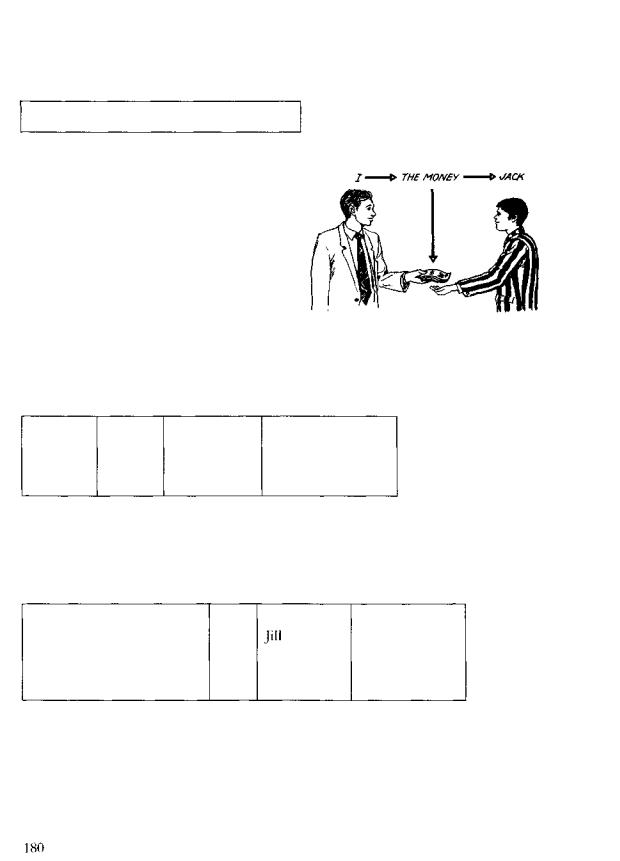
UNIT 90 Give me that book! Give it to me!
give |
lend |
pass |
send |
show |
After these verbs (give, lend etc.) there are two possible structures:
(give) something to somebody
- I gave the money to Jack.
or (give) somebody something
-I gave Jack the money.
•(give) something to somebody
-That book is mine. Give it to me!
-This is your father's key. Can you give it to him?
- |
I lent my car to a friend of mine. |
||||
- |
'Have you seen these photographs?' 'Yes, you showed them to us.' |
||||
|
|
|
(something) |
to |
(somebody) |
Can you |
give |
this key |
to |
your father? |
|
Can you |
give |
it |
to |
him? |
|
|
I |
lent |
my car |
to |
a friend of mine. |
You |
showed |
them |
to us. |
||
•(give) somebody something
- Give me that book! It's mine. (not 'Give to me that book!')
— Tom gave his mother some flowers. (not 'Tom gave to his mother some flowers.')
Tom Don't forget to Can you
If you see Jack, can you How much money did you
|
(somebody) |
(something) |
gave |
his mother |
some flowers. |
send |
|
a birthday card. |
pass |
me |
the salt, please? |
give |
him |
this letter? |
lend |
them? |
|
Compare:
- I gave the book to Pat.
but I gave Pat the book. (not 'I gave to Pat the book.')
We prefer the first structure (give something to somebody) when the thing is it or them:
-I gave it to her. (not usually 'I gave her it.')
-Give them to your father. (not usually 'Give your father them.')
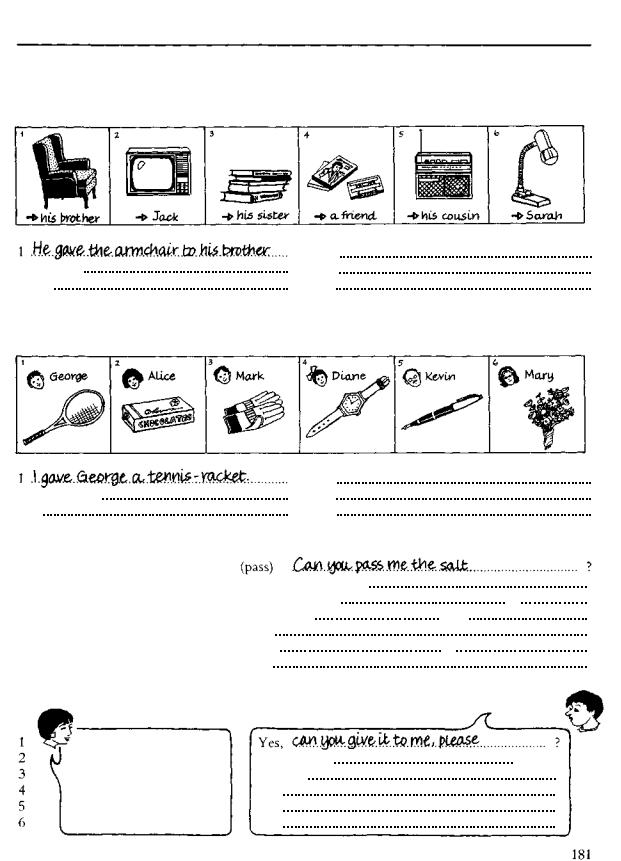
UNIT 90 Exercises
90.1 Mark had some things that he didn't want - an armchair, a TV set, some books, some cassettes, a radio and a lamp. He gave these things to different people. Look at the pictures and write a sentence for each thing.
|
|
4 |
2 |
He gave |
5 |
3 |
He |
6 |
90.2 You wanted to give presents to your friends. You thought about it and and you decided to give them the things in the pictures. Write a sentence for each person.
|
|
|
4 |
|
|
2 |
I gave Alice |
|
5 |
|
|
3 |
I |
|
6 |
|
|
90.3 Write questions beginning Can you ... ? Use the verb in brackets ( |
). |
|
|||
1 |
(you want the salt) |
|
|
|
|
2 |
(you need an umbrella) |
(lend) |
Can you lend |
|
? |
3 |
(you want your coat) |
(give) |
Can you |
my |
? |
4 |
(Mary needs a bicycle) |
(lend) |
Can |
Mary |
? |
5 |
(Tom wants some information) |
(send) |
|
|
? |
6 |
(you want to see the letter) |
(show) |
|
me |
? |
7 |
(they need £100) |
(lend) |
|
|
? |
90.4 Write questions beginning Can you give ... ?
Do you want the book? |
|
|
Do you want this key? |
Yes, can you |
, please? |
Do you want these keys? |
Yes, can |
? |
Do you want this knife? |
Yes, |
? |
Do you want this money? |
Yes, |
? |
Do you want these letters? |
Yes, |
? |
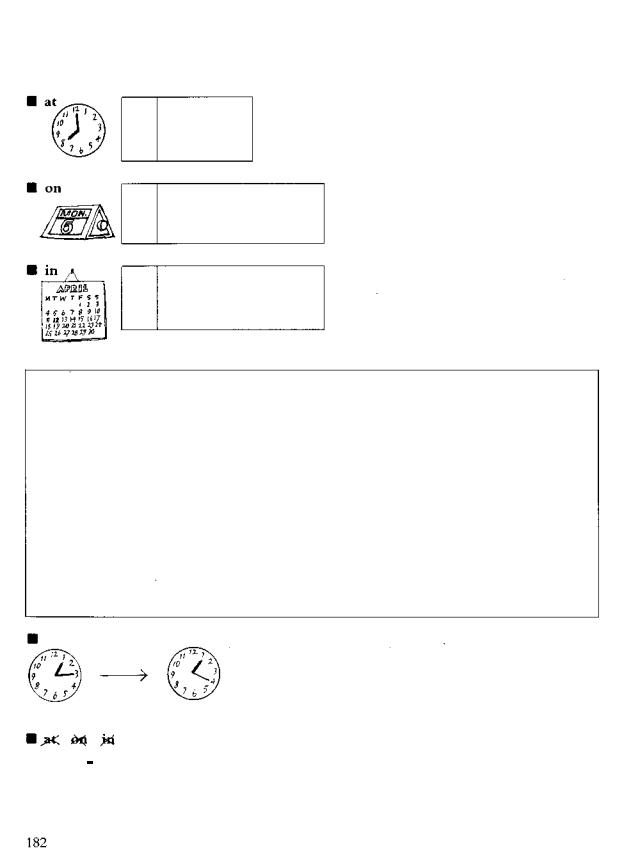
UNIT 91 at 10.30 on Monday in April
8 o'clock |
- |
I start work at 8 o'clock. |
at 10.30 |
- |
The shops close at 5.30 p . m . |
midnight etc. |
|
|
Sunday(s)/Monday(s) etc. on 25 April / 6 June etc.
New Year's Day etc.
April/June etc. in 1985/1750 etc.
(the) summer/spring etc.
-Goodbye! See you on Friday.
-I don't work on Sundays.
-The concert is on 22 November.
-I'm going on holiday in October.
-Jill left school in 1984.
-The garden is lovely in spring.
also |
|
|
at the weekend |
- |
Are you going away at the weekend? |
night |
- |
I can't sleep at night. |
Christmas/Easter |
- |
In Britain children get presents at Christmas. |
|
|
(but on Christmas Day) |
the end o f . . . |
- |
I'm going on holiday at the end of October, |
the moment |
- |
Arc you busy at the moment? |
in the morning / in the afternoon / in the evening
-I always feel good in the morning.
-Do you often go out in the evening?
but
on Monday morning / on Tuesday afternoon / on Friday evening / on Saturday night etc.
- |
I'm meeting Jill on Monday morning. |
- |
Are you doing anything on Friday evening? |
in five minutes / in a few days / in six weeks / in two years etc
|
|
- |
Hurry! The train leaves in five minutes. |
|
|
|
(= it leaves five minutes from now) |
|
|
- |
Goodbye. I'll sec you in a few days. |
now |
in five minutes |
|
(= a few days from now) |
We do not use at/on/in before: this . . . (this morning / this week etc.)
every . . . (every day / every week etc.)
last ... |
(last August / last week etc.) |
n e x t . . . |
(next Monday / next week etc.) |
-They're going on holiday next Monday, (not 'on next Monday')
-Last summer we went to Scotland, (not ' In last summer')
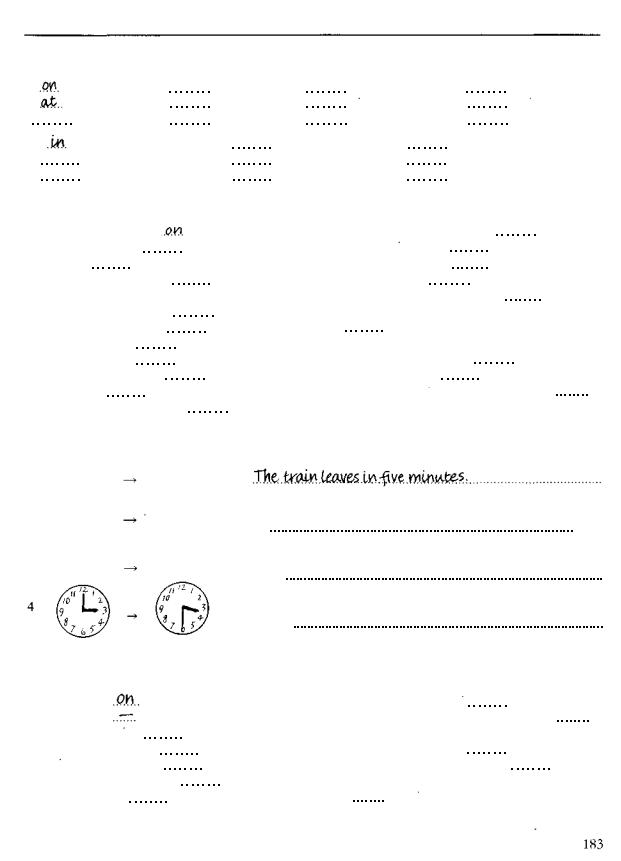
UNIT 91 |
Exercises |
|
|
|
|
|||
91.1 |
Write at/on/in. |
|
|
|
|
|
|
|
1 |
.. 6 |
June |
4 |
12.30 a.m. |
7 |
24 September |
10 |
half past two |
2 |
.8o'clock |
5 |
1977 |
8 |
Friday |
11 |
Christmas Day |
|
3 |
Wednesday |
6 |
September |
9 |
1984 |
12 |
winter |
|
13 |
. the evening |
16 |
Saturday night |
19 |
the weekend |
14 |
the morning |
17 |
night |
20 |
Tuesday afternoon |
15 |
Monday morning |
18 |
Christmas |
21 |
the end of my holiday |
91.2 Write at/on/in. |
|
|
||
1 |
Goodbye! See you |
. Friday. |
||
2 |
Where were you |
28 February? |
||
3 |
I got up |
8 o'clock this morning. |
||
4 |
I like getting up early |
|
the |
|
|
morning. |
|
|
|
5 |
My sister got married |
|
May. |
|
6 |
Diane and I first met |
|
1979. |
|
7 |
Did you go out |
Friday? |
||
8 |
Did you go out |
Friday evening? |
||
9 |
Do you often go out |
|
the evening? |
|
10 Let's meet |
7.30 tomorrow evening. |
|||
11 I'm starting my new job |
3 June. |
|||
91.3 Write sentences with in ...
12 |
We often go to the beach |
summer. |
|
13 |
George isn't here |
the moment. |
|
14 Julia's birthday is |
January. |
||
15 |
Do you work |
Saturdays? |
|
16 |
1 will send you the money |
the end |
|
|
of this month. |
|
|
17 |
autumn, the leaves fall from the |
||
|
trees. |
|
|
18 The company started |
1969. |
||
19 I often go away |
the weekend. |
||
20I like looking at the stars in the sky night.
1now
17.2517.30
2 M O N D A Y THURSDAY
3 14JUNE |
28JUNE |
It's 17.25 now. The train leaves at 17.30. |
|
It's Monday today. I'll phone you on Thursday. |
|
I'll |
days. |
It's 14 June today. My exam is on 28 June. |
|
My |
|
It's 3 o'clock now. Tom will be here at 3.30. |
|
Tom |
|
91.4 Write at/on/in if necessary. (Sometimes there is no preposition.)
1 |
I'm leaving |
Saturday. |
||
2 |
I'm leaving |
next Saturday. |
||
3 |
I always feel tired |
the evening. |
||
4 |
Will you be at home |
|
this evening? |
|
5 |
We went to Scotland |
|
last summer. |
|
6 |
What do you usually do |
the weekend? |
||
7 |
She phones me |
|
every Sunday. |
|
8 Can you play tennis |
next Sunday? |
9I'm afraid I can't come to the party Sunday.
10 |
We went to bed late |
last night. |
|
11 |
I don't like going out alone |
night. |
|
12 |
I won't be out very long. I'll be back |
||
|
ten minutes. |
|
|
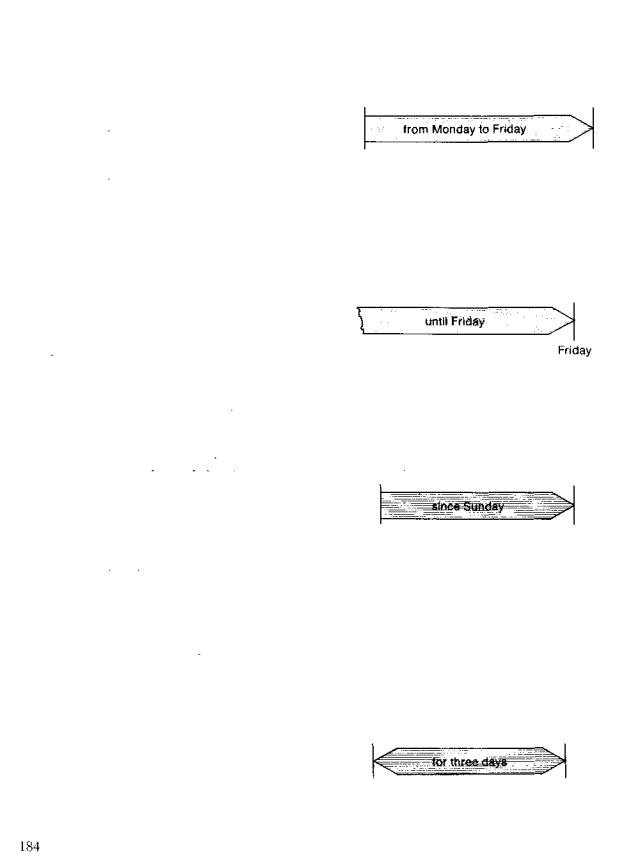
UNIT 92 from... to until since for
•from . . . to . . . :
-We lived in Canada from 1977 to 1985.
-I work from 9 o'clock to 5.30 every day.
You can also say from |
until : |
Monday |
Friday |
|
|
-We lived in Canada from 1977 until 1985.
•until + the end of a period:
until Friday until 1999 until 10.30 until I come back
-They're going away tomorrow. They'll be away until Friday.
-I went to bed early last night but I wasn't tired. 1 read a book until 3 a.m.
-Wait here until I come back.
You can also say till (= until): |
|
|
— Wait here till I come back. |
|
|
Compare: |
|
|
- |
'How long will you be away?' |
'Until (or till) Monday.' |
- |
'When are you coming back?' |
'On Monday.' |
• since + the beginning of a period (from the past to now):
since Monday since 1958 since 2 o'clock since I arrived
We use since after the present perfect (have been / have done etc.):
-John is in hospital. He has been in hospital since Monday. (= from Monday to now)
-Mr and Mrs Kelly have been married since
|
1958. (= from 1958 to now) |
Sunday |
now |
- |
It has been raining since I got up. |
|
|
Compare: |
|
|
|
- |
We lived in Canada from 1977 to 1985. |
|
|
|
We lived in Canada until 1985. |
|
|
Now we live in England. We came to England in 1985.
We have lived in England since 1985. (= from 1985 until now)
Use for (not since) + a period of time (three days / ten years etc.):
-John has been in hospital for three days, (not 'since three days')
•for + a period of time:
for three days for ten years for ten minutes for a long time
-George stayed with us for three days.
-I'm going away for a few weeks.
-They've been married for ten years.
Monday — Tuesday — Wednesday
present perfect + for and since • Units 17-18
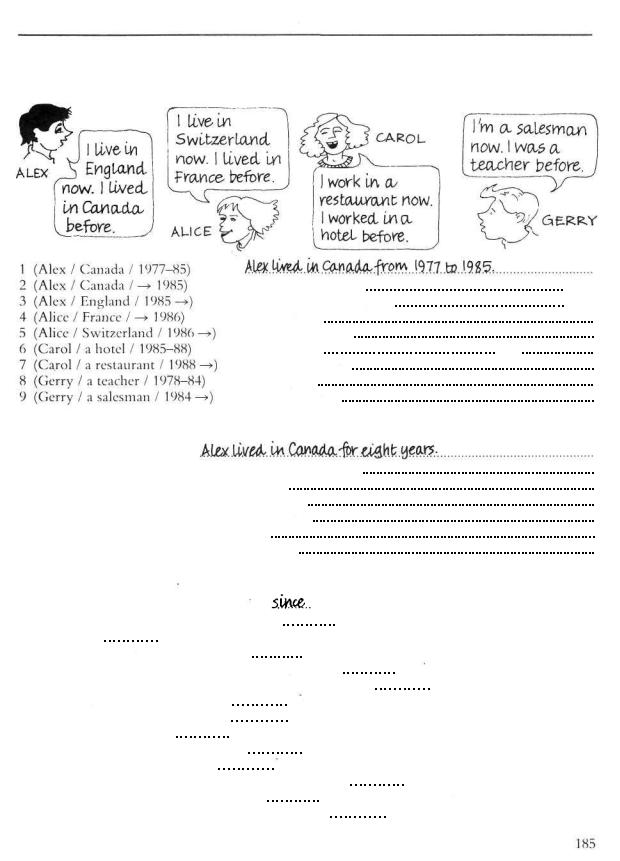
UNIT 92 Exercises
92,1 Read the information about these people and complete the sentences. Use from ... to / until / since.
|
|
|
|
Alex lived in Canada |
1985. |
||
|
|
|
|
Alex has lived in England |
1985. |
||
|
|
|
|
Alice lived in |
|
|
|
|
|
|
|
Alice has lived in |
|
|
|
|
|
|
|
Carol worked |
|
1985 |
|
|
|
|
|
Carol has worked |
|
|
|
|
|
|
|
Gerry was a |
|
|
|
|
|
|
|
Gerry has been |
|
|
|
Now write sentences with for. |
|
|
|
|
|
||
10 |
(Alex / Canada) |
|
|
|
|
|
|
11 |
(Alex / England) |
|
Alex has lived in England |
|
|
||
12 |
(Alice / Switzerland) |
Alice has lived |
|
|
|
||
13 |
(Carol / a hotel) |
|
Carol worked in |
|
|
||
14 |
(Carol / a restaurant) |
Carol has worked |
|
|
|||
15 |
(Gerry / a teacher) |
|
Gerry was |
|
|
|
|
16 |
(Gerry / a salesman) |
Gerry has been |
|
|
|||
92.2 Put in until/since/for |
|
|
|
|
|
||
1 |
Mr and Mrs Kelly have been married |
1958. |
|
|
|||
2 |
I was tired this morning. I stayed in bed |
10 o'clock. |
|||||
3 |
We waited |
half an hour, |
but they didn't come. |
|
|||
4 |
'How long have you been here?' |
' |
half past |
eight.' |
|
||
5 |
'How long did you stay at the party last night?' ' |
|
midnight.' |
||||
6 |
John and I are good friends. We have known each other |
ten years. |
|||||
7 |
I'm tired. I'm going to lie down |
|
a few minutes. |
|
|||
8 |
Don't open the door of the train |
|
it stops. |
|
|
||
9 |
I've lived in this house |
I was seven years old. |
|
||||
10 Jack has gone away. He'll be away |
next Wednesday. |
||||||
11 Next week I'm going to Paris |
four days. |
|
|
||||
12 |
I usually finish work at 5.30, but sometimes I work |
|
6 o'clock. |
||||
13 'How long have you known Ann?' ' |
we were at school together.' |
||||||
14 Where have you been? I've been waiting for you |
20 minutes. |
||||||
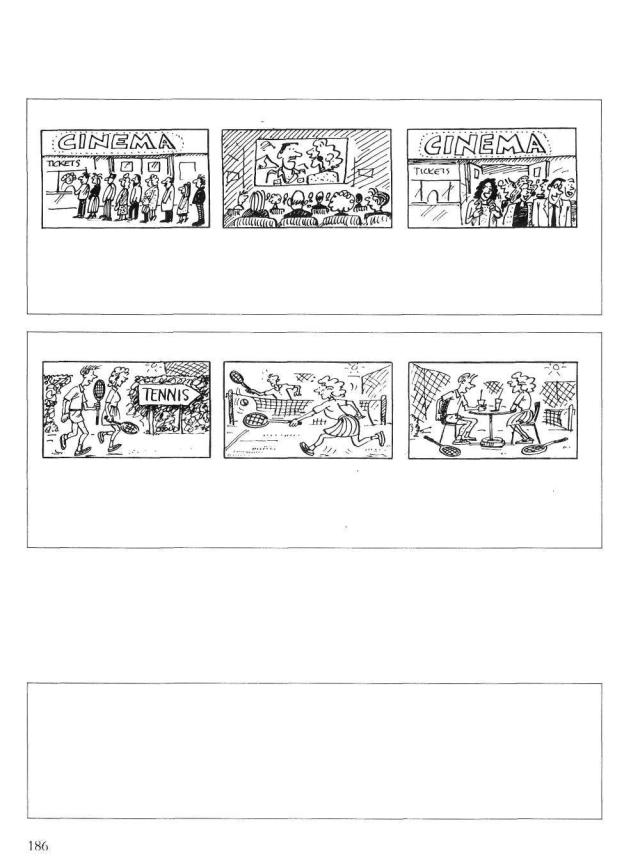
UNIT 93 before after during while
before |
during |
after |
before the |
film |
during the |
film |
after the film |
-Before the examination everybody was very nervous.
-I went to sleep during the film.
-We were tired after our visit to the museum.
before |
while |
after |
before we played |
while we were playing |
after we played |
-Don't forget to close the windows before you go out.
-I went to sleep while I was watching television.
-They went home after they did the shopping.
• We use during + noun (during the film), while + verb (while 1 was watching):
- We didn't speak during the meal.
but We didn't speak while we were eating, (not 'during we were eating')
past continuous (I was -ing) • Units 12-13
•You can say before -ing and after -ing:
before -ing
-I always have breakfast before going to work.
(= before I go to work)
-Before eating the apple, she washed it very carefully.
(= before she ate the apple)
after -ing
-I started work after reading the newspaper.
(= after I read the newspaper)
-After doing the shopping, they went home.
(= after they did the shopping)
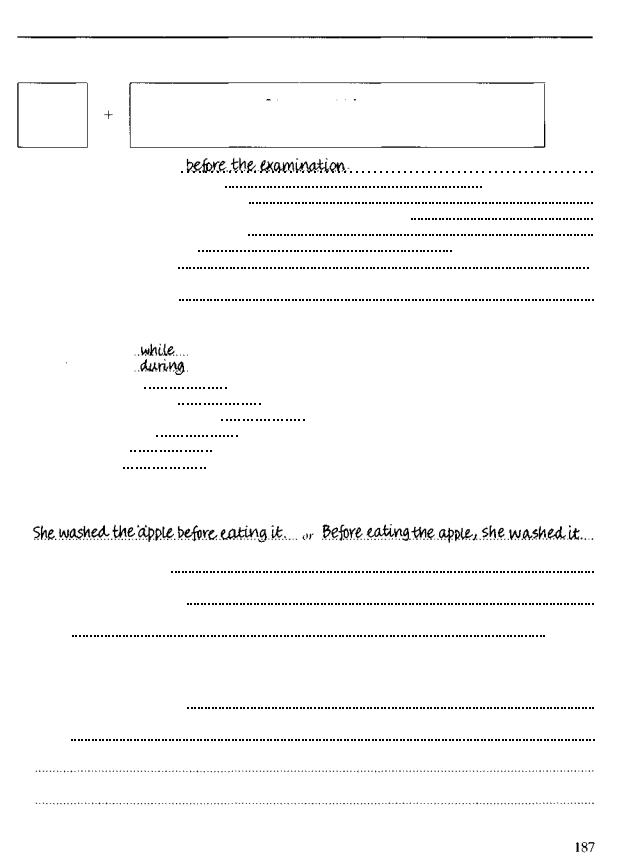
UNIT 93 Exercises
93.1 Complete the sentences. Use before/during/after + the best ending from the box.
before |
the concert |
the examination |
they went to Australia |
during |
the course |
lunch |
you cross the road |
after |
the end |
the night |
|
1 Everybody was nervous |
|
|
|
2 I usually have lunch at 1.30, and |
|
I go back to work. |
|
3The film was very boring. We left
4Ann went to evening classes to learn Spanish. She learnt a lot
5My aunt and uncle lived in London
6 |
Somebody broke a window |
Did you hear anything? |
|
7 |
A: Are you going home |
|
? |
|
B: No, we're going to a restaurant. |
|
|
8 |
Always look both ways |
|
|
93.2 Put in during or while. |
|
|
|
1 |
We didn't s p e |
. we were eating. |
|
2 |
We didn't speak |
.... the meal. |
|
3 |
George telephoned |
you were out. |
|
4 |
She wrote a lot of letters |
she was on holiday. |
|
5 |
The students looked very bored |
the lesson. |
|
6 |
I read the newspaper |
I was waiting for Jack. |
|
7 |
I don't eat much |
the day, but I always have a big meal in the evening. |
|
8 |
I fell out of bed |
I was asleep. |
|
93.3 Complete these sentences with before -ing ...
1She washed the apple. Then she ate it.
2Think carefully. Then answer the question. Think carefully before
3Mary put on her glasses. Then she read the letter. Mary put on her glasses
4The man took off his coat. Then he got into the car.
Before |
his coat. |
Write sentences with after -ing ...
5We walked for three hours. We were very tired. We were very tired after
6I ate too much chocolate. I felt sick. I felt
7I read the book a second time. I understood it better.
8 John left school. Then he worked in a department store for two years.
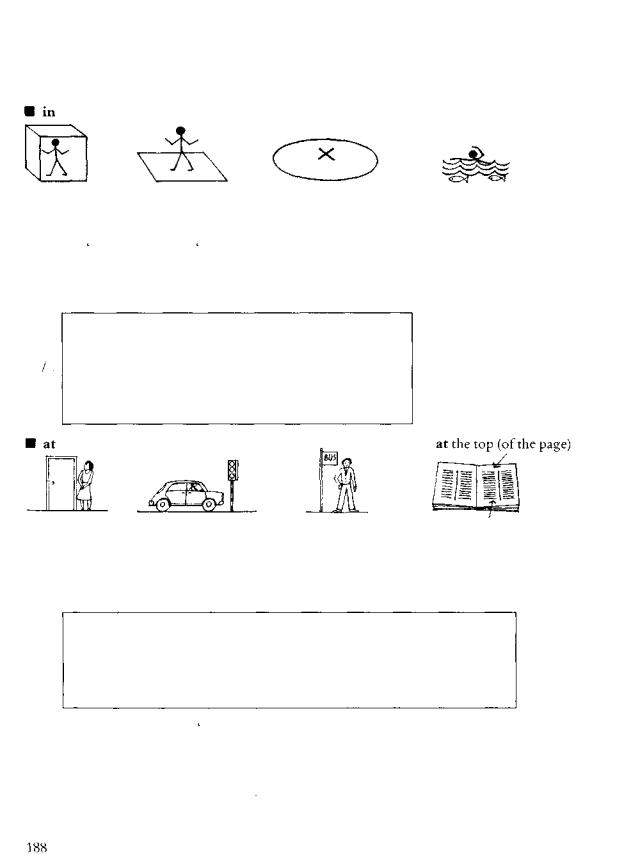
UNIT 94 in at {places)
in a room |
in a garden |
in France |
in the water |
in a shop |
in a park |
in Rome |
in the sea |
in a box |
in a town |
in the city centre |
in my coffee |
-Where's Tom?' In the kitchen. / In the garden. / In London.'
- |
Milan is in the north of Italy. |
|
|
- I like swimming in the sea. |
|
||
- I live in a town but I want to live in the country. |
|||
also |
in bed |
in hospital / in prison |
|
|
in a street |
in the sky |
in the world |
in a newspaper / in a magazine / in a book in a photograph / in a picture
in a car (but on a bus / on a train / on a plane) in the middle (of . . . )
at the door |
at the traffic lights |
at the bus-stop |
at the bottom |
-Why is that man standing at the door?
-Turn left at the traffic lights.
-There is nobody at the bus-stop.
-Please write your name at the top of the page.
also |
at home / at work / at school |
at |
university |
|
at the station / at the airport |
at |
the end (of the street) |
at the hairdresser('s) / at the doctor('s) / at the dentist('s) etc. at Jane's (house) / at my sister's (house)
at a concert / at a conference / at a party / at a football match etc.
-'Where's Tom?' At work. / At home. / At the doctor's.'
-Do you want me to meet you at the airport?
-There weren't many people at the party.
- My house is at the end of the street.
• Often in or at is possible for a building (hotels, restaurants etc.): - We stayed at a nice hotel, or We stayed in a nice hotel.
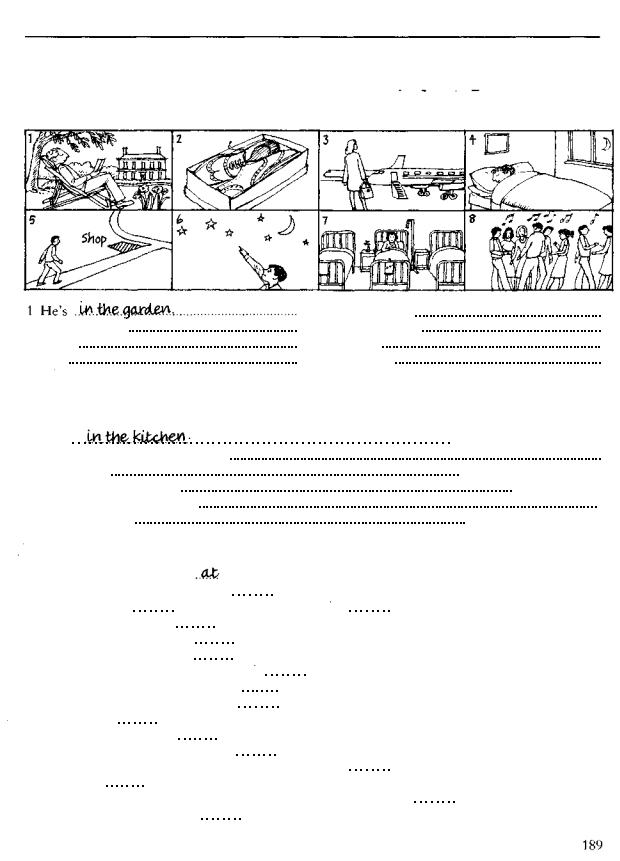
UNIT 94 Exercises
94.1 Complete the sentences for the pictures. Use in or at + one of these:
the airport |
bed |
a box |
the end of the street |
the garden |
hospital |
a party |
the sky |
|
|
|
|
|
|
5 |
The shop is |
2 |
The shoes are |
6 |
The stars are |
3 |
She's |
7 |
She's |
4 |
He's |
8 |
They're |
94.2 Complete the sentences. Use in + one of these:
this book |
that |
field |
the |
kitchen this photograph |
the river |
my tea |
||||
1 Pat is |
|
|
|
|
|
|
She's cooking the dinner. |
|||
2 Look at those beautiful horses |
|
|
|
|
|
|||||
3 |
Don't swim |
|
|
|
|
|
|
The water is very dirty. |
||
4 |
There's too much sugar |
|
|
|
|
|
I can't drink it. |
|||
5 |
How many pages are there |
|
|
|
|
|
? |
|||
6 Who is the man |
|
|
|
|
|
? Do you know him? |
||||
94.3 Write in or at. |
|
|
|
|
|
|
|
|||
|
1 |
'Where's Tina?' |
'She's |
|
work.' |
|
|
|
|
|
|
2 |
Why didn't the bus-driver stop |
the bus-stop? |
|
|
|
||||
|
3 |
Go straight on |
the roundabout and turn right |
the church. |
|
|||||
|
4 |
There was a big table |
the middle of the room. |
|
|
|
||||
|
5 |
What is the longest river |
|
the world? |
|
|
|
|||
|
6 |
Were there many people |
|
the concert on Friday? |
|
|
||||
|
7 |
My brother is studying mathematics |
London |
University. |
|
|
||||
|
8 |
'Where does your sister live?' |
' |
Brussels.' |
|
|
|
|||
|
9 |
Did you read about the accident |
the newspaper? |
|
|
|||||
10 Will you be |
|
home tomorrow afternoon? |
|
|
|
|||||
11 Munich is a large city |
the south |
of Germany. |
|
|
|
|||||
12 'Do you work?' |
'No, I'm still |
school.' |
|
|
|
|||||
13 George is coming by train. I'm going to meet him |
the station. |
|
||||||||
14 Charlie is |
|
hospital. He's going to have an operation tomorrow. |
|
|||||||
15 There was a list of names on the notice-board. My name was |
the bottom of the list. |
|||||||||
16 I usually do my shopping |
|
the city centre. |
|
|
|
|||||
